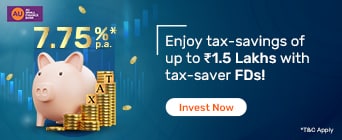Fixed deposits are the traditional savings option for risk-averse investors. The rising interest rates, however, have attracted other investors looking to diversify their portfolios and earn better returns. Today, a majority of financial institutions offer FDs with lucrative terms.
Among these is a flexible tenor, which affects whether an FD is classified as a long-mid or short-term instrument. These are mainly differentiated by tenor and serve varied financial goals. To learn more about long-term fixed deposits and how they differ, read on.
Long-term fixed deposits typically have a lengthy tenor that exceeds five years. Based on the issuer, the tenor for FDs for the long term can range from 7 days up to 10 years. Given this flexibility, long-term FDs are the preferred option to grow your corpus securely.
In fact, FDs are ideal for certain long-term objectives. Some examples of these long-term goals include overseas education, weddings, retirement, real estate investments, etc. This is because the key benefit of long-term FDs is you enjoy the power of compounding interest.
Here, the interest earned is reinvested periodically and continuously accrues interest throughout the tenor. Naturally, this leads to higher earnings if you stay invested for a longer duration.
As such, rising long-term FD interest rates are an opportunity to grow your wealth steadily and securely.
Interest rates play a significant role when measuring returns. Simply put, the higher your interest rate, the better your returns. As such, long-term fixed deposits are a smart choice as they allow you to invest at a high rate for an extended period of time.
Moreover, senior citizen investors enjoy an even greater benefit, as they get higher long-term fixed deposit rates than those for regular investors.
Given below is a table to give you an overview of the FDs and the rates offered on Bajaj Markets.
Each tenor type has its benefits, and assessing these benefits is key. Here are the benefits you can enjoy with a long-term fixed deposit:
Higher interest rates than short-term or mid-term deposits
Senior citizens enjoy an even higher interest rate
Better returns due to compounding interest for a longer window
Secured savings tool with stable returns
Can be pledged as security/collateral to avail of credit
Thanks to digitisation, investment processes have become easier and quicker. To invest in a fixed deposit for a long term online, all you have to do is follow these steps:
Step 1: Visit Bajaj Markets
Step 2: Navigate to the Fixed Deposit page via the ‘Investments’ drop-down menu
Step 3: Click on ‘Invest Now
Step 4: Enter your mobile number, date of birth, and OTP to verify your account
Step 5: Enter the deposit amount, tenor, and type of interest payout
Step 6: Provide your PAN/Aadhaar or upload the relevant documents to complete your KYC
Step 7: Complete the payment via UPI or NetBanking
You will receive an acknowledgement on your registered email and mobile number within 15 minutes confirming your deposit has been booked.
You can even invest offline by visiting the issuer’s branch and submitting a physical form. In the offline process, the issuer may ask you to invest through a cheque or other modes. Be sure to check if the investment mode is feasible before beginning the investment process.
On Bajaj Markets, you can access some of the best investment offers and also get access to tools like the fixed deposit calculator. Such provisions help you invest smartly and efficiently.
Thanks to the power of compounding interest, the easiest way to maximise your returns with long-term FDs is to stay invested. This is because your interest earnings are continually reinvested based on the compounding frequency.
So, your total earnings for a tenor of five years or more can be quite significant if you let the money grow undisturbed. Another way to maximise your returns is to opt for the cumulative payout.
In doing so, you are likely to get a higher rate than if you were to opt to go with a non-cumulative FD. Moreover, you enjoy the full benefit of interest compounding.
Other FD Related Pages |
||
Is a fixed deposit ideal for the long term?
Yes, if you want to invest for long-term goals such as education, marriage, etc., then you should consider booking a long-term FD.
How long can I invest in a fixed deposit?
The maximum tenor for your FDs depends on the issuer. Generally, you can choose FDs for a tenor of up to 10 years.
What is the minimum and maximum amount to start a long-term FD?
The minimum and maximum deposit amounts vary for each issuer. Depending on the issuer you choose, you can start at just ₹1,000. As for the maximum amount, issuers may allow you crores, with some having no upper limit whatsoever.
Which FD is best for the long term?
For higher returns on investment, it is best to consider a company’s FD, such as Bajaj Finance. A company FD always provides higher interest rates than a bank FD, so staying invested for the long term at a higher rate will translate into better returns.
Is long-term FD taxable?
The interest earned from a long-term FD is not tax-free, and you are liable to pay tax as per your income slab.
Can I book an FD for 20 years?
The maximum tenor for a long-term FD is 10 years.




